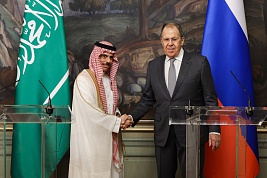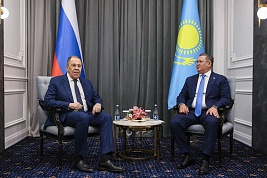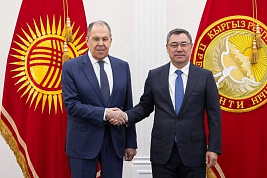Presentation and answers to questions of mass media by Russian Foreign Minister Sergey Lavrov during joint press conference summarizing the results of negotiations with Minister of Foreign Affairs of the Republic of Armenia Edward Nalbandian, Moscow, 25 April 2013
Ladies and Gentlemen,
We have conducted good negotiations with Minister of Foreign Affairs of Armenia Edward Nalbandian. Their main content was the review of the course of execution of the agreements reached on 12 March of this year during the visit of the President of Armenia Serzh Sargsyan to the Russian Federation. We noted that the agreements are being fulfilled. We agreed on how to intensify this process for faster exit to practical results in all lines.
Russia-Armenia relations are partner, strategic relations of allies. This is confirmed not only by high quality of our political dialog at the summit and high levels, but also by intergovernmental contacts, the state of trade, economic and investment interaction. In 2012, the circulation of goods between our countries increased by almost one fifth and made 1.2 billion US dollars; Russian investments accumulated in Armenia are estimated at 3 billion dollars. These processes have positive dynamics, therefore in the short term we will see more significant numbers.
Today we have agreed on the steps that we need to make to consolidate the bilateral contractual and legal framework. About 20 draft agreements are pending. I think that we will be able to report about the readiness of these documents for signature soon.
We are satisfied with the development of our cooperation in the humanitarian sphere, including cultural and educational exchanges. Centres of free learning of Russian are opening, the network of classrooms is creating in Armenia. We note that Armenian youths have an active interest in studying Russian. We will support it in all possible ways.
We talked about cooperation in the foreign policy sphere, coordination of our actions in different international structures based on the agreements that were reached by foreign ministers within the framework of CSTO and CIS. We will further consolidate Russia-Armenia interaction in the UN, OSCE. This year we will pay particular attention to cooperation in the Council of Europe and BSEC, taking into account that Armenia will preside there in May.
We noted progress in the implementation of agreements of heads of states in respect of review of the possibilities of cooperation of Armenia with the Customs Union, Common Economic Space. We positively evaluate the work of the joint Russian-Armenian commission formed for consideration of respective issues. The Memorandum of Cooperation between the Euroasian Economic Union and the Government of the Republic of Armenia signed on 10 April of this year will give additional dynamics to this process.
We exchanged opinions about issues of security, stability, cooperation in Transcaucasia, including the problems of the Nagorny Karabakh settlement. Russia as a co-chair of the OSCE Minsk Group intends to continue its search for mutually acceptable climaxes by the parties. We will try to further contribute to it.
In general, I will repeat it, the negotiations were good. I think they will be beneficial for Russia-Armenia relations.
Question (to both ministers): What is your evaluation of the efficiency of interaction of Russia and Armenia within the framework of CSTO?
Sergey Lavrov: The efficiency is high. Russia and Armenia are committed to the agreements reached by of heads of states, including at the CSTO summit in December 2012, targeted to the consolidation of possibilities of the Organization to react on any external threats and to ensure sovereignty of its member states. This work is conducted on a permanent basis.
Just recently the Russian Defence Minister Sergey Shoigu and the Chief of the General Staff of the Armed Forces Valeriy Gerasimov visited Armenia, where they discussed ways of strengthening cooperation in the military and military and technical spheres both in the bilateral line and within the framework of CSTO.
The Organization has another important foreign policy rather than military line of work that is related to the cooperation of activities at the international arena – in the UN, OSCE, Council of Europe and other structures. I can say that we have exemplary cooperation in this context – we always support each other. We will continue in this way.
Question: The Karabakh negotiation process is at a dead end now after the meeting of leaders of Azerbaijan, Armenia and Russia in Kazan in 2011, as well as after extradition of Ramil Safarov to Azerbaijan. Does Russia undertake any steps as a co-chair of the OSCE Minsk Group to activate this process? Will the Russian party provide any new initiatives?
Sergey Lavrov: Russian approaches are well known, they are not something independent. We work exclusively within the framework of activity of three co-chairs of the OSCE Minsk Group, together with our American and French partners. At different stages, participants of this trio made propositions that were supported by individual co-chairs. Irrespective of formulations the nature of these propositions is to attain the creation of conditions when the parties can agree, and only they themselves may do it. Such line of co-chairs is reflected in those fundamental principles that were repeatedly supported by statements of presidents of Russia, USA and France in the last three-four years. We are committed to this line; continue our work in such composition of the group of co-chairs to help to renew the negotiation process. Meetings take place regularly, including recent contacts. Additional events are expected that will allow understanding how far we have advanced with the renewal of the negotiations.
We do not reduce our activity and will continue our work.


